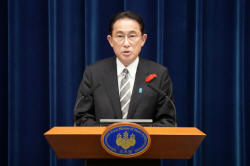|
"It's left to the Bank of Japan to decide on specific monetary
policy, including the thinking on an exit from monetary easing,"
Kishida told parliament.
"We hope the BOJ continues to make efforts to achieve its 2%
inflation target," he said.
Kishida's comments came in response to a question from
opposition lawmaker Hitoshi Asada, who called on the government
to focus on structural reforms rather than rely too heavily on
ultra-loose monetary policy to reflate growth.
"Ultra-loose policy can't continue indefinitely. Without reform,
it will only cause price hikes. We're nearing the limit and a
potential exit from easy policy," Asada said.
With consumer inflation well below its 2% target, the BOJ has
stressed it is in no rush to exit from ultra-easy policy and
described recent cost-push inflation as transitory.
But some opposition lawmakers have warned of the hit to
households from rising food and fuel prices, a sign creeping
inflation is emerging as a political topic ahead of upper house
elections scheduled later this year.
Policymakers see higher wage growth as crucial to mitigate the
pain on households and pull the economy out of the doldrums
caused by the impact of the COVID-19 pandemic.
There is uncertainty over whether companies will heed Kishida's
requests for them to raise wages as their margins have been
squeezed by a record spike in wholesale prices.
"While prices go up, the economy is slumping. There is growing
fear Japan may experience stagflation," opposition lawmaker
Yuichiro Tamaki said, during the questioning of Kishida in
parliament a day earlier.
Japan's core consumer inflation hit 0.5% in December from a year
earlier, well below the BOJ's 2% target. The gain was driven
mostly by higher fuel costs and a steady wave of price hikes for
foodstuffs such as cooking oil and mayonnaise.
(Reporting by Tetsushi Kajimoto; writing by Leika Kihara;
Editing by Muralikumar Anantharaman, Kim Coghill & Simon
Cameron-Moore)
[© 2022 Thomson Reuters. All rights
reserved.]
This material may not be published,
broadcast, rewritten or redistributed.
Thompson Reuters is solely responsible for this content.

|
|





